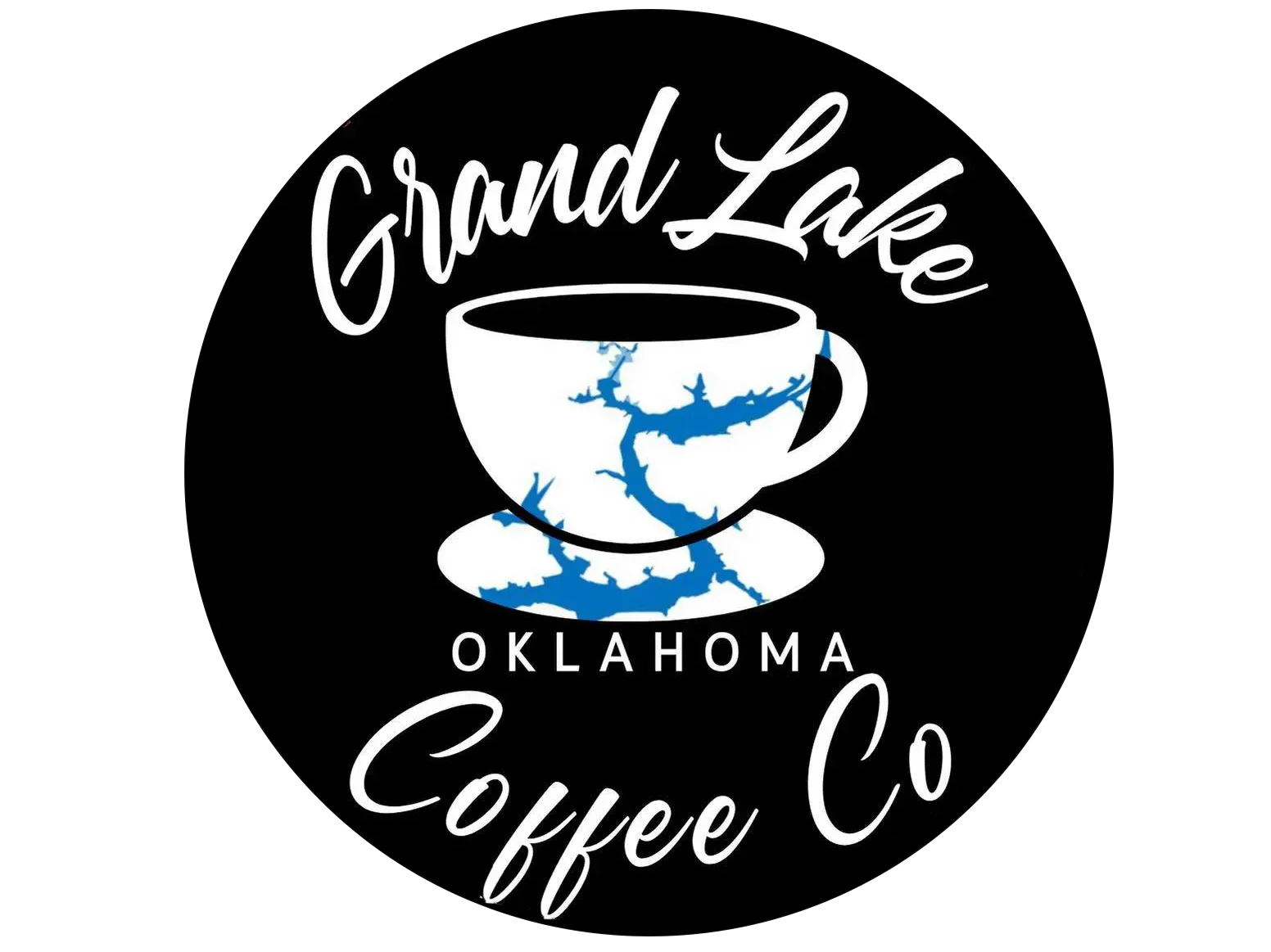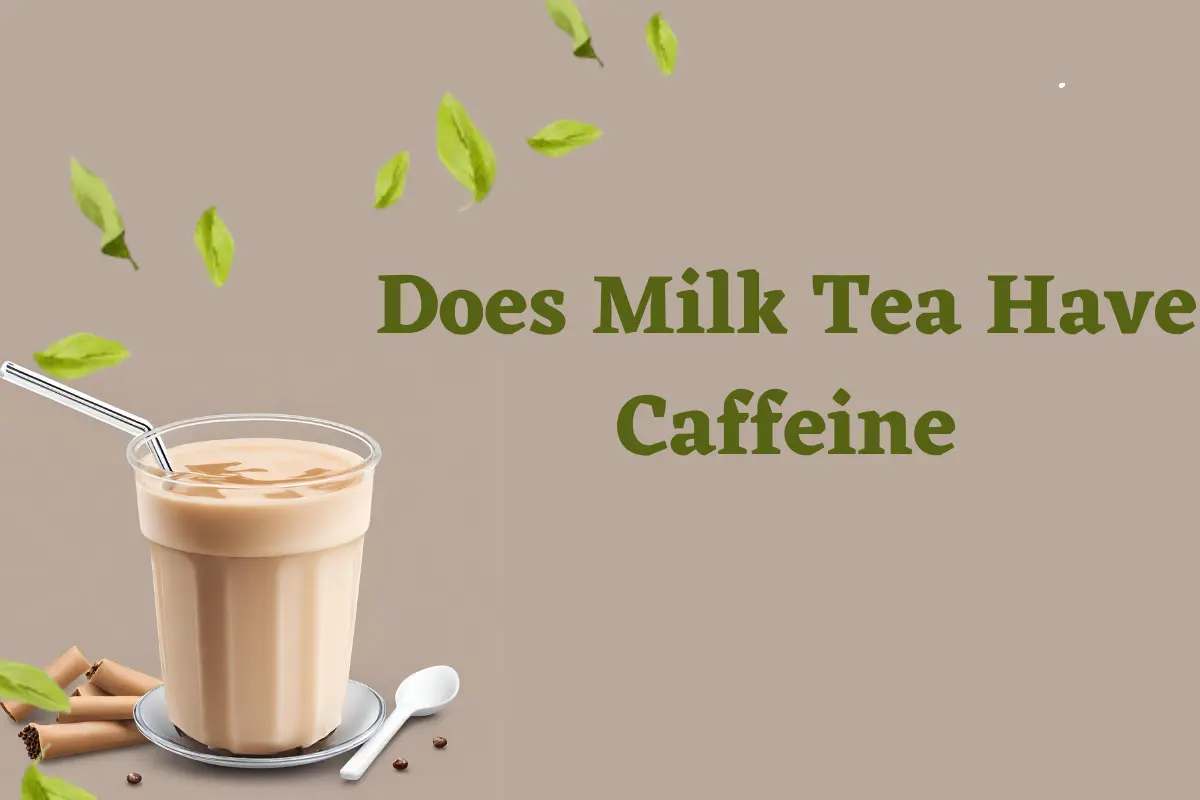Yes, milk tea contains an average of 35.6 mg of caffeine per cup. Milk tea, with its diverse flavors and comforting blends, offers a popular alternative to coffee. However, like its caffeinated counterpart, milk tea often carries a caffeine kick derived from its tea base. The exact amount of caffeine in your cup can vary significantly depending on the type of tea used and the preparation method.
Let’s delve into the factors that influence the caffeine content of milk tea and understand how it might affect your daily intake.
Importance of Knowing Caffeine Content in Milk Tea
From the iconic Taiwanese bubble tea to the classic British builder’s brew, milk tea comes in endless varieties catering to diverse tastes. Its creamy texture and customizable flavors make it appealing across age groups.
While tea itself offers antioxidants and potential health benefits, the addition of milk and potential sweeteners needs consideration, particularly for those watching their sugar intake.
Does milk tea have caffeine? Understanding caffeine levels in milk tea is essential for individuals sensitive to caffeine. Those prone to anxiety, sleep disturbances, or heart palpitations might need to moderate their consumption or choose low-caffeine options.
Similarly, pregnant women and those with certain medical conditions should consult their physicians regarding safe caffeine intake. It’s important to debunk the misconception that milk somehow neutralizes caffeine; the stimulant properties of the tea remain.
Several factors influence how much caffeine ends up in your milk tea. The type of tea plays a crucial role – black teas generally contain more caffeine than green or white teas. Brewing time matters too; the longer the tea steeps, the higher the caffeine extraction. Additionally, the ratio of tea to milk can dilute caffeine levels.
Knowing the potential caffeine content in milk tea allows for informed consumption and helps individuals manage their overall caffeine intake throughout the day. By being mindful of the varieties, preparation methods, and individual sensitivities, people can enjoy the delights of milk tea responsibly.
Is Milk Tea Caffeine Free?
The question of does milk tea have caffeine? isn’t a simple yes or no.
Most classic milk teas rely on black, green, or oolong teas for their base. These varieties all derive from the Camellia sinensis plant, a natural source of caffeine. The exact amount of caffeine in your cup will vary depending on the type of tea, how long it’s brewed, and how much tea is used in the drink.
Generally, black tea offers the strongest caffeine kick, followed by green tea, and then oolong. Steeping time is crucial – the longer the tea leaves are in the water, the more caffeine is released. Finally, the size of your milk tea matters; a larger serving translates to a higher dose of caffeine.
- Black tea – 20 mg caffeine per 100 g
- Green tea – 12 mg caffeine per 100 g
- Oolong tea – 16 mg caffeine per 100 g
Even if milk is added to your tea, it doesn’t neutralize the caffeine. The stimulant effect of the tea remains.
If you’re looking for a truly caffeine-free experience, seek out milk tea varieties made with herbal or fruit infusions. Popular choices include chamomile, rooibos, and various fruit-flavored “teas.”
List of Ingredients in Milk Tea
Milk tea, with its enticing blend of flavors and textures, typically includes a combination of the following ingredients:
Essential Ingredients
Tea:
- Black tea (Assam, Ceylon, Darjeeling, Earl Grey) offers diverse flavor profiles, from bold and malty to delicate and citrusy.
- Oolong provides a middle ground with options like creamy Tie Guan Yin or the naturally sweet Milk Oolong.
- Green tea delivers a fresher flavor, with popular choices like Sencha or the more potent Matcha.
- Herbal/Fruit Infusions like rooibos, chamomile, or fruit blends create naturally caffeine-free milk tea variations.
Milk:
- Whole milk adds creaminess and richness.
- Plant-based alternatives like almond, soy, oat, or coconut milk provide options for different preferences and dietary needs.
- Condensed or evaporated milk offers extra sweetness and a thick, luxurious texture.
Sweetener (Optional):
- Classic white sugar is versatile, but brown sugar adds a warm, molasses-like depth.
- Honey, maple syrup, or agave nectar provide unique flavor nuances.
- For sugar-free options, consider stevia or other natural sweeteners.
Popular Additions (Optional):
- Tapioca Pearls (for bubble tea): These chewy treats add a fun textural element to this unique milk tea style.
- Spices: Masala chai is the standard-bearer, incorporating warming spices like ginger, cardamom, cinnamon, cloves, and even black pepper.
Flavorings (Optional):
- Extracts like vanilla, almond, or hazelnut add aromatic complexity.
- Fruit syrups offer an endless array of flavors, from classic strawberry or mango to more exotic choices.
- Chocolate, in powder or syrup form, transforms milk tea into a decadent dessert-like drink.
Milk Tea Nutritional Information
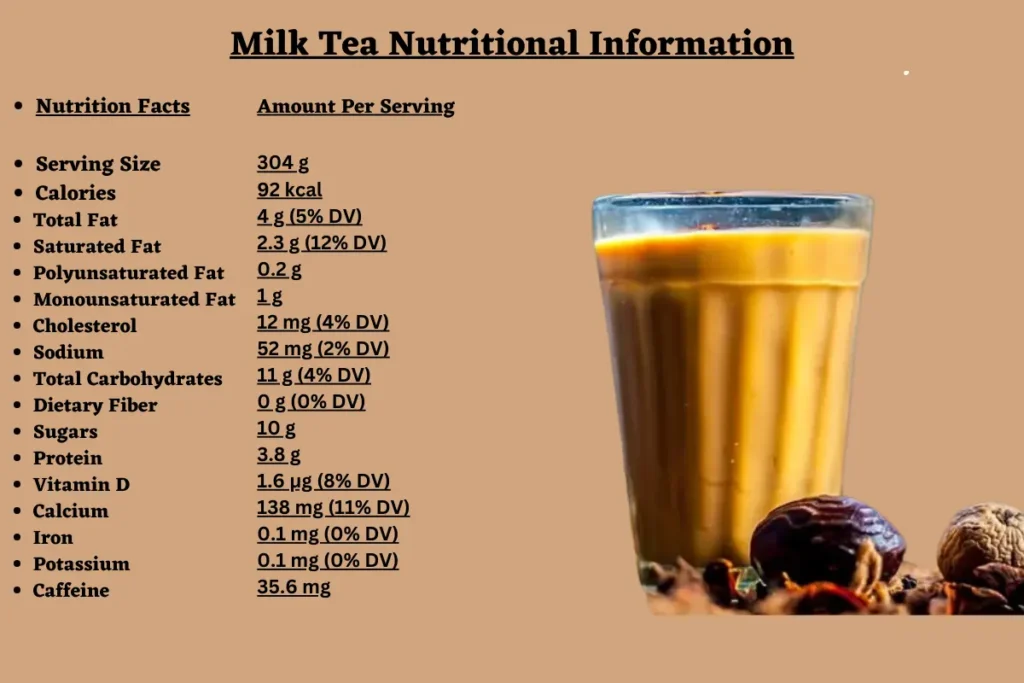
A typical 304g serving of milk tea contains approximately 92 calories. It provides around 4 grams of total fat, with 2.3 grams of saturated fat. You’ll also find around 12 milligrams of cholesterol and 52 milligrams of sodium in each serving. In terms of carbohydrates, milk tea delivers about 11 grams, including 10 grams of sugar, but without any dietary fiber.
As for beneficial nutrients, the drink offers roughly 3.8 grams of protein, 1.6 micrograms of vitamin D (about 8% of your daily value), 138 milligrams of calcium (approximately 11% of your daily value), and a small amount of potassium (about 4% of your daily value). Finally, expect a moderate dose of caffeine at approximately 35.6 milligrams per serving.
| Nutrition Facts | Amount Per Serving |
| Serving Size | 304 g |
| Calories | 92 kcal |
| Total Fat | 4 g (5% DV) |
| Saturated Fat | 2.3 g (12% DV) |
| Polyunsaturated Fat | 0.2 g |
| Monounsaturated Fat | 1 g |
| Cholesterol | 12 mg (4% DV) |
| Sodium | 52 mg (2% DV) |
| Total Carbohydrates | 11 g (4% DV) |
| Dietary Fiber | 0 g (0% DV) |
| Sugars | 10 g |
| Protein | 3.8 g |
| Vitamin D | 1.6 µg (8% DV) |
| Calcium | 138 mg (11% DV) |
| Iron | 0.1 mg (0% DV) |
| Potassium | 198.4 mg (4% DV) |
| Caffeine | 35.6 mg |
Milk Tea Variants and their Caffeine Content
Milk tea comes in a wide variety of flavors and styles, each offering a unique twist on this beloved beverage. Here are some popular milk tea variants:
Classic Milk Tea
Made with black tea and milk, this traditional version of milk tea offers a rich and creamy flavor profile with a hint of sweetness. It contains 20-70 mg of caffeine per 8 oz serving, depending on the type and strength of the black tea used.
Green Milk Tea
Prepared with green tea instead of black tea, green milk tea has a lighter and more delicate flavor, complemented by the creamy texture of milk. It has 25-45 mg of caffeine per 8 oz serving, as green tea generally contains less caffeine than black tea.
Thai Milk Tea
Thai milk tea is a popular beverage in Thailand. It is created with sweetened condensed milk, strongly brewed black tea, and spices like cardamom or star anise, which give the drink a pleasant and aromatic taste. Caffeine content is 20-70 mg per 8 oz serving, depending on the type and strength of the black tea used.
Hong Kong Milk Tea
Hong Kong milk tea is a potent and robust tea produced with a blend of black tea leaves and evaporated or condensed milk, giving it a smooth and velvety texture. It is often referred to as “silk stocking tea” because of its preparation method, which involves using a cloth filter. It has 20-70 mg of caffeine per 8 oz serving, depending on the type and strength of the black tea used.
Bubble Tea (Boba Tea)
Originating from Taiwan, bubble tea is a fun and playful twist on milk tea, featuring chewy tapioca pearls (boba) added to the beverage. It contains 20-70 mg of caffeine per 8 oz serving, depending on the type of tea used (black, green, or oolong).
Matcha Milk Tea
Made with high-quality Japanese matcha powder, matcha milk tea is a vibrant and earthy beverage that combines the creamy richness of milk with the bold flavor of matcha, resulting in a refreshing and energizing drink. The caffeine content is 25-70 mg per 8 oz serving, as matcha contains a higher concentration of caffeine compared to regular green tea.
Taro Milk Tea
Taro milk tea is a sweet and creamy beverage made with taro powder or taro syrup, which imparts a unique purple color and nutty flavor to the drink, creating a delightful indulgence for taro lovers. It includes 20-70 mg of caffeine per 8 oz serving, depending on the type of tea used as a base (usually black or green tea).
Winter Melon Milk Tea
Prepared with winter melon syrup, winter melon milk tea offers a refreshing and subtly sweet flavor profile with hints of caramel and honey, making it a popular choice for those seeking a lighter alternative to traditional milk tea. It has 20-70 mg of caffeine per 8 oz serving, depending on the type of tea used as a base (usually black or green tea).
Alternatives to Milk Tea and their Caffeine Content
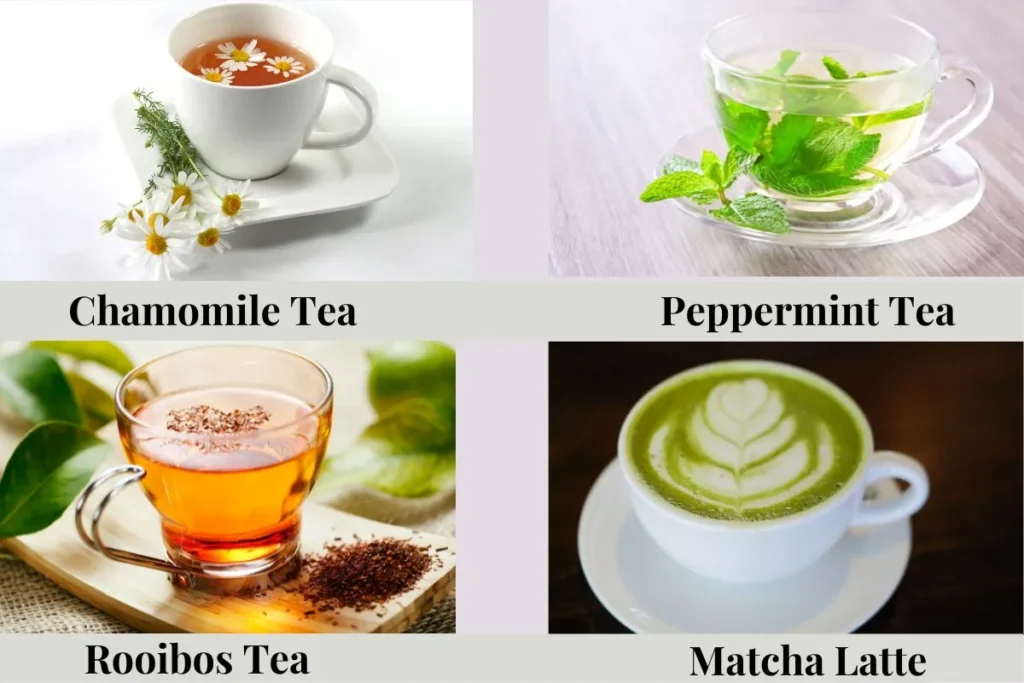
There are several alternatives to traditional milk tea that offer unique flavors and varying levels of caffeine. These include:
Chamomile Tea
Chamomile Tea delicate herbal tea boasts a gentle floral aroma and a subtly sweet flavor. For centuries, chamomile has been cherished for its calming effects. It may promote relaxation and aid sleep, making it an ideal pre-bedtime beverage. Experiment by pairing chamomile with other soothing flavors like lavender or honey.
Rooibos Tea
Hailing from South Africa, this vibrant red tea delights with a naturally sweet flavor profile featuring notes of honey, vanilla, and a touch of earthiness. Rooibos is packed with unique antioxidants that may offer health benefits, potentially aiding heart health and supporting blood sugar control. Enjoy it hot or iced, and consider blending it with warm spices or fruity flavors.
Peppermint Tea
Peppermint tea delivers an invigorating burst of coolness thanks to its prominent menthol aroma. This refreshing beverage can provide a mental pick-me-up and is traditionally used as a digestive aid to ease occasional stomach discomfort. Peppermint combines beautifully with other herbs like lemongrass or ginger for an extra flavor dimension.
Matcha Latte
Matcha is a finely ground green tea powder that is whisked into hot water or milk to create a smooth, creamy beverage. It’s rich in antioxidants and provides a balanced caffeine boost without the jitters.
Chai Latte
Chai is a spiced tea blend typically made with black tea, milk, and a combination of aromatic spices like cinnamon, cardamom, ginger, and cloves. It offers a warm, comforting flavor and a moderate amount of caffeine.
Yerba Mate
This traditional South American beverage is made from the leaves of the yerba mate plant. It has an earthy, slightly bitter taste and contains caffeine, as well as other nutrients. Many people enjoy it as a coffee alternative for its energizing effects.
Golden Milk
Also known as a turmeric latte, golden milk is a caffeine-free beverage made with turmeric, milk (dairy or plant-based), and often includes other spices like cinnamon and ginger. Turmeric is known for its anti-inflammatory properties, and this drink has gained popularity for its potential health benefits.
| Product | Caffeine Content |
| Chamomile Tea | Caffeine-free |
| Rooibos Tea | Caffeine-free |
| Peppermint Tea | Caffeine-free |
| Matcha Latte | 80 mg per 16 fl oz |
| Chai Latte | 95 mg per 16 fl oz |
| Yerba Mate | 80 mg per 150 ml |
| Golden Milk | Caffeine-free |
Recommended Daily Intake of Milk Tea
While the recommended daily intake (RDI) of caffeine for healthy adults is 400mg, a typical 304g serving of milk tea contains around 35.6mg. This means one milk tea usually provides about 8.9% of your recommended daily caffeine allowance. However, it’s crucial to remember that the caffeine content in milk tea can vary significantly depending on the type of tea used, brewing strength, serving size, and added ingredients.
Additionally, individual sensitivity to caffeine differs – some people might find even a small amount too stimulating. To manage your overall caffeine intake, consider how much you consume from other sources like coffee, chocolate, or energy drinks – and factor that in when enjoying your milk tea.
Conclusion
Does Milk Tea Have Caffeine? Milk tea does often contain caffeine, though the exact amount depends on factors like the type of tea, brewing method, and added ingredients. While a typical serving might not exceed a moderate dose of caffeine, it’s essential to be aware of your overall daily intake from various sources.
Those sensitive to caffeine may want to choose teas with lower caffeine content, opt for shorter brewing times, or explore delightful caffeine-free alternatives like herbal and fruit infusions.
Frequently Asked Questions
Q1: Can I make caffeine-free milk tea at home?
Absolutely! Making a caffeine-free version of milk tea at home is incredibly easy. Simply select a caffeine-free herbal or fruit-infused tea as your base. Follow brewing instructions, add your choice of milk (dairy or plant-based), and sweeten to taste if desired.
Q2: How does caffeine affect the taste of milk tea?
Caffeine contributes a slightly bitter or astringent quality to the flavor of tea. This bitterness can vary depending on the tea type and how long you steep it. Generally, the milk and sweetener in milk tea will help balance this bitterness.
Q3: Is caffeine in milk tea harmful?
For most healthy adults, the amount of caffeine in milk tea consumed in moderation won’t pose significant harm. However, those sensitive to caffeine, pregnant women, or those with certain medical conditions might need to be more cautious. If you experience negative effects like anxiety, insomnia, or heart palpitations, it’s wise to limit your intake or opt for caffeine-free alternatives.
Q4: What are the benefits of choosing decaffeinated milk tea?
Decaffeinated milk tea allows you to enjoy the comforting flavors of traditional milk tea with significantly reduced caffeine. This is an excellent choice for those who love the taste of black or green tea but want to avoid the stimulating effects of caffeine, especially in the evenings or if you’re sensitive to its effects.
Q5: Does Milk Tea Have Caffeine?
Most traditional milk teas made with black, green, or oolong tea leaves will contain caffeine since it naturally occurs within these tea varieties. However, you can find plenty of milk tea options that are completely caffeine-free. These are often made with herbal infusions (like chamomile or rooibos) or fruit-based blends.
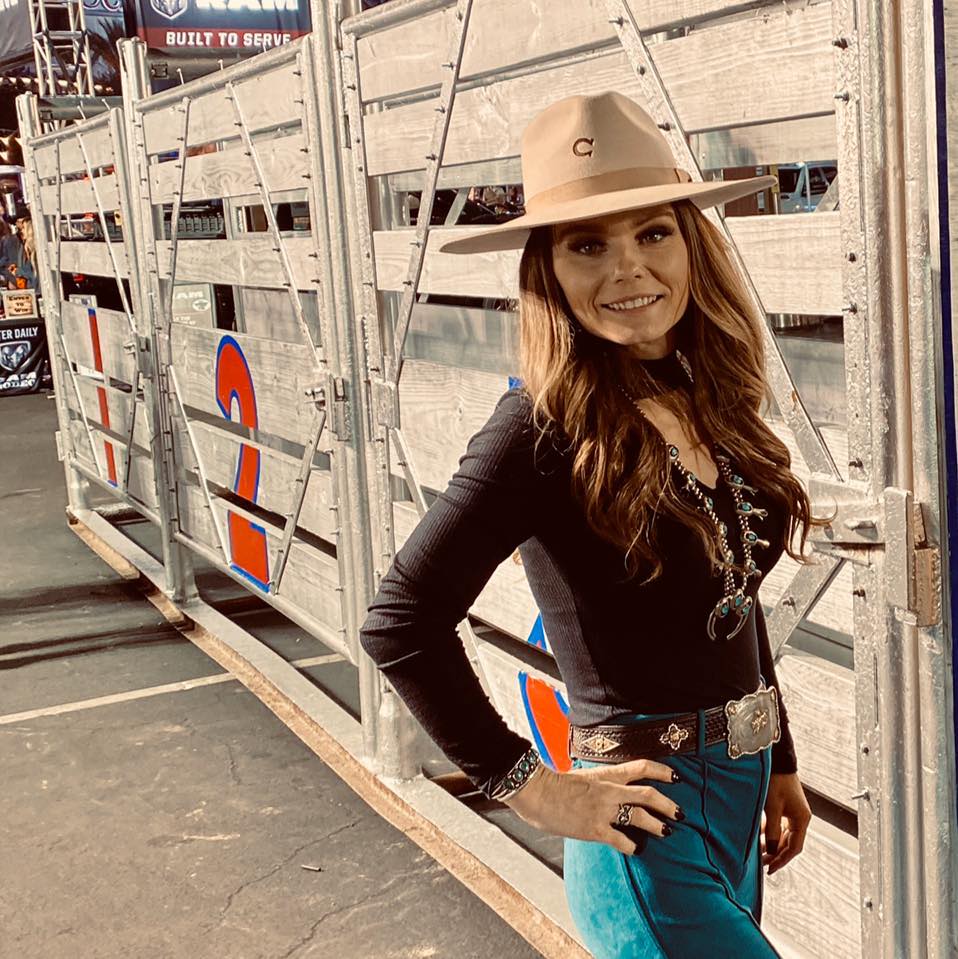
Rossi Glover, the passionate Owner of Grand Lake Coffee, infuses every cup with her love for coffee and dedication to quality. With an extensive background in the art and science of coffee, Rossi is not just a connoisseur but a storyteller, sharing the intricate tales behind each brew.
